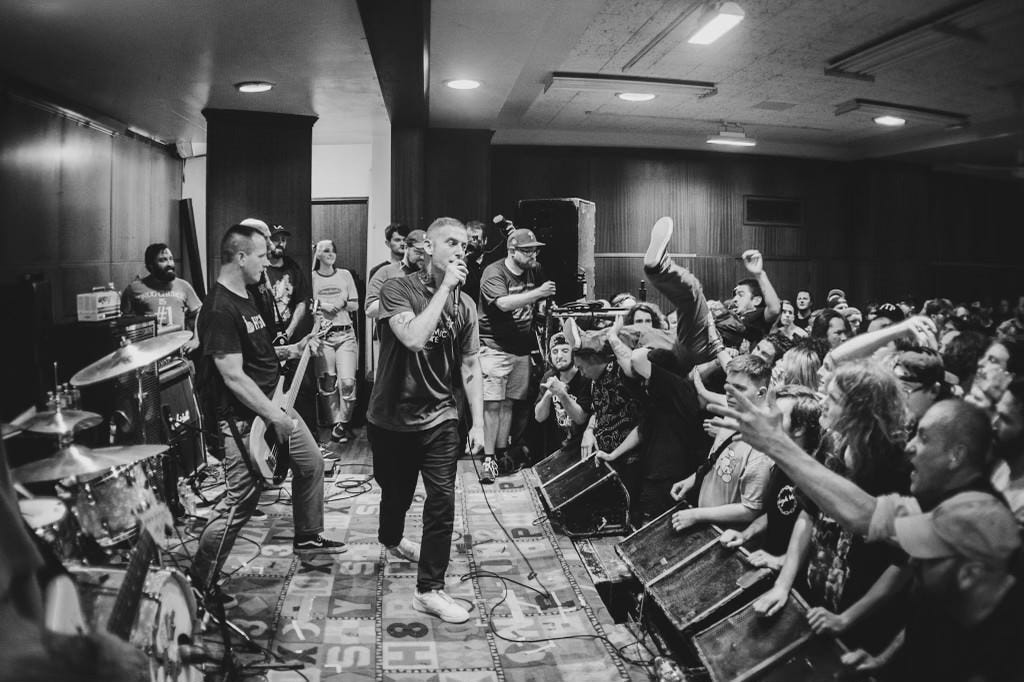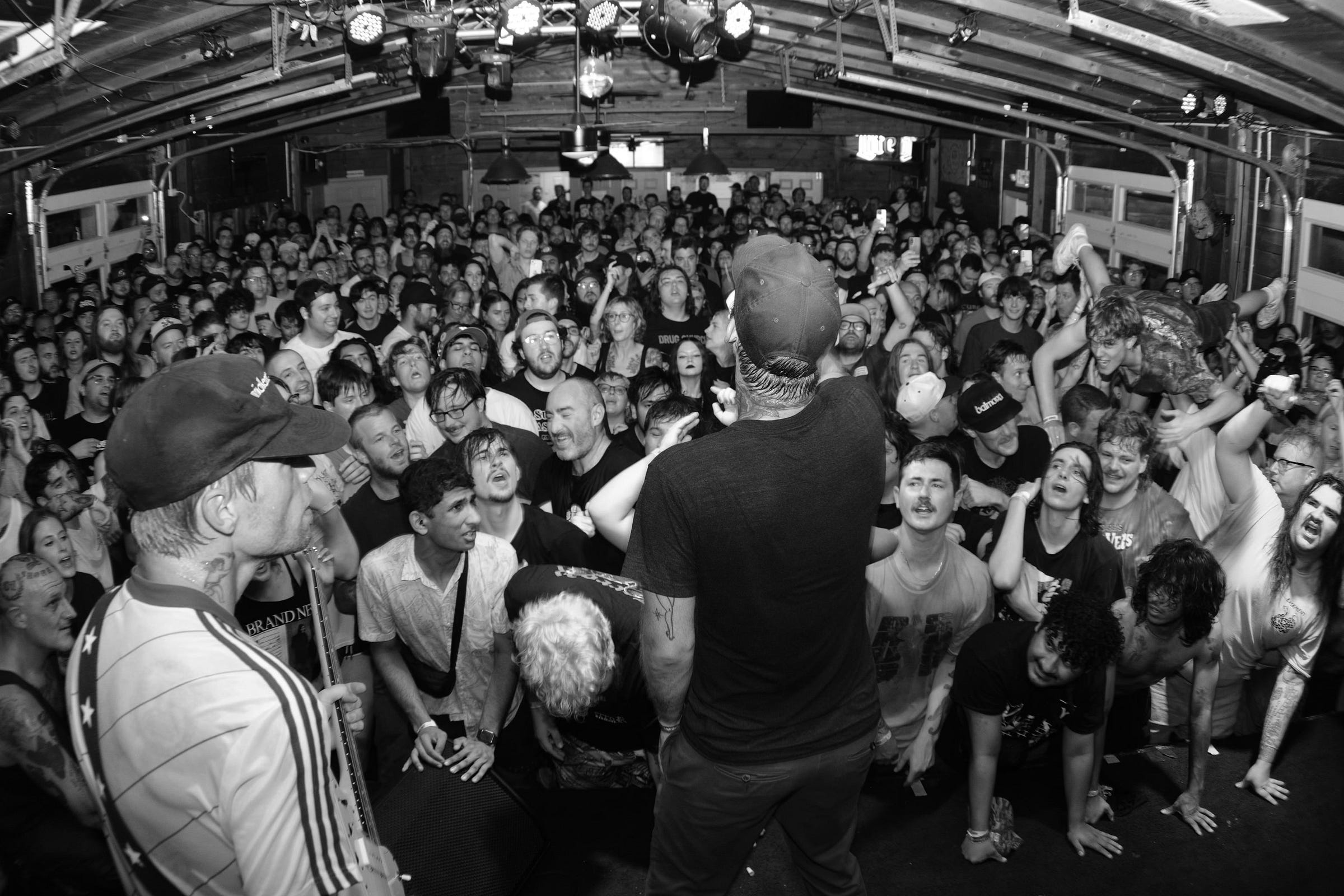An Interview with Drug Church's Patrick Kindlon
Showing hole, aging poorly, and Chappell Roan.

Hello and welcome to ZERO CRED, the only music newsletter ever to exist. Subscribe and get new posts sent to you for free. You can also support this independent publication by upgrading to a paid subscription which gets you a personalized membership card that provides you with irrefutable proof that you are not a poser.
I’d never met Drug Church frontman Patrick Kindlon before last week, but I found myself feeling surprisingly defensive whenever I read a headline about him. At least one of the following adjectives is inevitably used to describe the hardcore singer: “contrarian,” “controversial,” “confrontational.” One headline even called him “Punk’s Big Bad Wolf.” Do any of these descriptors really fit the guy? Loquacious, sure. But contrarian? It seemed like an especially unfair label to assign him for doing an interview, a format in which he is voluntarily answering questions that were asked of him.
Maybe I’m being a bit defensive because I have also been perceived as a contrarian. Or maybe it’s the contrarian in me that is moved to defend this commonly held perception of a stranger. All of this analyzing is a waste of time, of course, because Kindlon doesn’t really care about perception. He is uninterested in his public image, because, frankly, it’s not his problem.
“It's entirely possible I could say, quote-unquote, the wrong thing, which is in its own way confusing, because what's the wrong thing?” Kindlon says. “I am capable of saying a thing that people disagree with. If the things I say are not all in accordance with the desires of everybody who scrutinizes me, I'm very sorry to inform them there's nothing I can do for that.”
But in questioning the positions of the band’s frontman, the music often gets overshadowed, which is a shame, because for more than a decade, Drug Church has been one of the most explosive bands in hardcore. Over four albums and a handful of EPs, the band has never thrown a major curveball at their audience or taken a hard left turn. Each album simply offers a small but significant evolution from the release that came before it. Maybe their sound is slightly more polished or the band is a tiny bit tighter and heavier. Maybe they’ve picked up a new guitar tone trick here and there, or have figured out how to better showcase Kindlon’s battering-ram vocals.
“I say this respectfully to my bandmates and I take full accountability for my own limitations in this, but there's no big brains, you know? Nobody's trying to be smarter than the room of people that like Drug Church. We're just playing music that comes out of our fingers and throats when we get together. So if there is going to be any type of evolution, I think it'll be rather slow,” Kindlon says.
Now, on their forthcoming fifth album, PRUDE, Drug Church is at their most fully formed, sonically, while Kindlon’s lyrics continue to explore topics familiar to the Drug Church faithful: the ways in which we police each other online, the judgment we cast on people we don’t personally know, and how all art ages poorly.
“People have called me out on this recently. They said, ‘You write about the same shit all the time.’ Well, no lies detected, as they say,” Kindlon laughs. “But it's not because I didn't say everything I needed to say about that topic. It's that I have only 110 thoughts in my whole fucking brain, and that happens to be one of them.”
The experience of interviewing Kindlon is like some sort of music journalist rite of passage that I had yet to cross. So, please, enjoy my very first conversation with him, in which we chat about, well, everything.
First off, congrats on getting married this year.
Patrick Kindlon: Thank you.
Can I assume from your tuxedo T-shirt that you're not precious about the idea of weddings?
No, I am not. I mean, we went to Vegas and we got married after our show with Alkaline Trio, at the venue. My wife and I are rather traditional in some respects, but neither of us feels an ounce of warmth for the actual ritual. It doesn't really matter. We just wanted to, as they say, affirm our love. So the venue for us wasn't terribly important, but it was a really nice time.
Do you feel any different now, being a married man? Has life changed at all?
I think my wife and I would both agree that I probably became married when I met my wife's child. I have a stepchild, and not every single mother conducts themselves the same way, but it was important to my wife that she didn't introduce her son to a number of people that she was dating. She really wanted to save that type of emotional heft for a guy that she was going to spend some real time with. So, we are married now, but we probably have been, as most people would understand it, married since I met her son. I think she would agree with me, but certainly I feel that way.
I wanted to start by getting a bit meta with you and asking about doing interviews. I didn't realize until a couple of years ago when I had something to promote myself, and was the person being interviewed, that it's actually more difficult than I thought to be on your end of it. And I think there is a skill to it. You have a reputation as being a great interview subject.
[Laughs] That’s nice.
But I wonder, do you enjoy doing them?
Well, I like talking to people, so I do enjoy it as far as a means to promote things that I do. It is the easiest on me, by far, because you and I can just have a nice conversation and it doesn't make me feel embarrassed. Now, in the [band’s] group chat, they're talking about this record release event, and I just want to fucking puke. I don't give a fuck about an event. I'm a very simple person. All I want to do in music is record the music and play the shows. I'm not trying to release sneakers, I don't want to do documentaries. I just play the show. So, for me, having a conversation is as low-stress as it gets, and I'm just being selfish and not wanting to work.
The element that I found the hardest about being interviewed is just being in my head and being worried about saying something that will read wrong in print or saying something that might be taken the wrong way. What is going through your head when you're doing an interview? Or are you just running on pure vibes?
It's funny you should say this. I reflected on this today. There's a thing, I think it's called the Gell-Mann Amnesia effect. That's the phenomenon of when you read something in print or see something on the news that you know to be untrue because you're a subject matter expert or you're a witness to it. You're able to register that the news is being untruthful or lying. However, the amnesia effect is that you are unable to extend that thinking outward and assume that the news does that about everything, including things you are not a subject matter in. So I was thinking I was suffering from some type of Gell-Mann Amnesia effect where, when I talked to journalists, I don't assume that they're trying to paint the worst image of me. However, I see it all the time. If I open Twitter right now, I bet I can find a Sabrina Carpenter quote that is cherry-picked to make this person look like somebody that they're not. Or not even something that they're not, but just isolating a very small part of what a person is.
I have the advantage of having a long—I wouldn't call it a career, but I have a long catalog—in music, and I also do comic books and podcasts, so if someone was being an honest broker, they would have an awful lot of me to sift through to determine what they really think about it. And I think that that's a real blessing in some ways. In some ways, it's terrible because there's more to hang me with. I'm always saying the wrong thing. But I think if you can admit that you're always saying the wrong thing or that you're capable of saying the wrong thing, people are more forgiving. I personally think that a lot of the problem comes from presenting as perfect or more enlightened people, and then by virtue of that, people want to see you humbled. They want to see you brought down. I try not to do that. When I see other bands selling a superiority or selling a sense of righteousness, I always think, “There but for the grace of God go I.” Because that's a rough ride for the individual who might have their own personal failings or foibles and then has to deal with the fact that they were lecturing for as long as they were.
I feel like you have a very good understanding of your own words being taken out of context or misconstrued, and you have a good hold on that. But when doing interviews, you represent your whole band. I'm curious about the inner workings of a band like Drug Church, who has a frontman who does interviews where he's very vocal. Do your bandmates always agree with what you're saying?
No, they don't agree with me about anything. I think that what we put on frontpeople is a little unfair. Sometimes they're straight-up fucking morons and they're just functionaries of the instrument. I won't name any names, but I watched an interview with a guy in a band I grew up on and like. They put a microphone in his face and he couldn't say anything of value. Not a single word that anybody would find interesting. Is that some type of self-defense? Maybe, but I think it's really just that he's probably a dummy. My point is, I yell into a microphone.
A guy who screams for money, to quote your own lyrics.
Yeah. Why people expect me to be anything other than a guy who yells into a microphone, it's confusing for me, because what possible insight could I offer? Firstly, if I was intelligent, I'd be wealthy. If I was enlightened, I can't imagine that I would spend my time working through my problems by screaming.
I hear you say that a lot, but you do several podcasts, you do several bands, you make comic books, you have things to say and you have an audience of people that listen, so I think the meritocracy proves that you are an above average orator. Yet I always hear you deflecting. This, “I don't know what I'm talking about, don't listen to me,” defense. I'm not trying to call you on this, but I do feel like you use this as an out. And I think you're smarter than you publicly give yourself credit for.
Well, I mean, maybe. It could be some type of cope or some type of defense mechanism. But I don't think so. I think I'm just of an age where I've met a lot of the people in music I respect, and they're almost uniformly fucking stupid. I find music to be this really beautiful thing if people take it on face value. It is! People, often with a tiny bit of talent or sometimes a lot of talent, who have a need, either throughout their entire lives or for a portion of their lives, to express themselves. And then there's other things that go into that. Maybe they're compensating. Maybe they're a narcissist. There's a million motivations. Maybe they have something to prove to their dad. Whatever it is. And those can all be beautiful in their own stupid way, too. But I just think that I don't even need to put up a defense, because I think that, on its own merits, the thing is valid enough.
If I say, “Music is fucking stupid, everybody involved in it is stupid, you shouldn't listen to them,” it really doesn't take a thing away from music! That's the beauty! That's the actual quality that you should enjoy. Guys who would be carnies otherwise are able to express themselves and sometimes even make money for their families. So, yeah, as you say, if I was putting up a defense, I don't even know if I would be able to register it, right? I wouldn't have control over that or insight. But I don't think that's what it is. I think it's just that I take what I do seriously, and I really very much love music. I just think that things don't have to be profound to be valuable.
Sure.
Not to get fucking emotional on you, but I'm going through a thing where I'm fucking sick to my stomach at profundity. I hate it. I hate a stranger's effort to enlighten me. I don't want anything to do with it. A lecturing tone makes the hair on the back of my neck stand up. An assertion that my moral better is someone who is quite obviously going through an intellectual phase that I don't trust to last in their lives, these are ludicrous ideas to me.
Getting back to what we were talking about with you doing press, it's funny, because a lot of times when I see press coverage of you, you are labeled as, like…
Oh, don't embarrass me. I hate this shit. [Laughs]
Well, I feel like you're labeled as a “contrarian” or “controversial” or “confrontational.” But I don't necessarily get that when I read the actual interview. And this is where I feel some sort of kinship with you. Whenever I go to a movie with friends, the first thing I do when we leave the theater is I'll just start rattling off problems I had with the movie. And my friends will roll their eyes and say, “Oh, here goes Dan, putting a wet blanket on it.” And I just don't understand that mentality at all. Do people not look at things with a critical eye? Do you get this response from the people in your life? Do your friends see you as a contrarian?
I mean, I was left on the side of the road 12 miles from my house because of Godzilla Vs. Kong.
[Laughs] Wait, which side were you on?
That it sucked. But I'm probably a Kong man, although I don't see any way that he can defeat Godzilla. But anyway, I hate those headlines. And it's always the headline. It's never the content of the actual article. You know, I've been watching Chappell Roan. I don't know a thing about her except for the TikToks I see on Twitter of her basically saying, “Well, fame kind of sucks. I'm not sure I'm with it.” On one level, there is something self-serving about wanting a thing very badly, going through all the steps to achieve it, and then going, “Ah, who could have seen this coming? I'm broadsided by this! It's crazy.” But I do understand that there is something fundamentally irritating about feeling as though, to do your job, you must be comfortable with being misrepresented. Now, I think some people would argue that's the cost of having a public life on any level in 2024, and maybe they're right. But it is frustrating, because I feel like these headlines are cooked up just to get me cooked in group chat. As soon as they go up, I'm getting murdered in these fucking group chats.
But, on some level, I'm sympathetic to Chappell Roan. I'm sympathetic to anybody who doesn't like to be lied about and is young. Because when you're young, you may not understand that that is seemingly the actual contract that you enter the second that you put yourself out into the world, that people are going to misinterpret you, people are going to take you in the worst possible spirit.
I’m not sure if this is related, but something that I've heard you talking about on your podcast recently is the concept of “showing hole” as an artist or creator. First of all, can you just explain what you mean by showing hole?
Sure. So, showing hole is internet slang for literally showing hole. I guess working in OnlyFans or whatever. I think it probably started as an insult and then was self-adopted by people who do show hole or maybe vice versa. But to me, showing hole is when you're doing too much that falls outside of your actual lane. You're going to get me in trouble with this one because this is my friends I'm talking about now.
No, but I also think that everybody who is tangentially in the music biz, or really any public business, has that friend or those friends who—for lack of a better term—are fucking cringe online, and everybody politely looks the other way when they show hole for attention. But I wonder if doing that kind of cringey stuff, playing the algorithm’s games of posting fucking selfies, posting fucking front-facing videos and stuff like that, I wonder how much it actually benefits them in the long run and if it's benefiting them in the way that they are seeking.
I don't think that showing hole doesn't work. Listen, people love hole, you know? It works. [Laughs] Again, forgive me, everybody. I don't need the Chappell Roan army to come down on me, but isn't some of what people love about her that she does TikToks where she does her whole little thing? And at 26, maybe she really does love doing it. No harm, no foul. But I'm talking about my contemporaries. Some of these fellows are in their thirties. Fuck it, I saw a band the other day that's in their fucking late forties who were just doing a little bit too much. But then again, let me be fair. If I told my wife, “Hey, our income could have been X, but instead it's going to be Y, because I refused to put on a top hat and dance on my fucking social media,” she would say, “Put on the fucking top hat now.”
That’s interesting, because if you look at Drug Church's social media accounts, they are stripped of anything even resembling hole. It’s funny, because you do these interviews where you’re very loquacious, but then every Drug Church post is just like, “Here are the tour dates.” “Here's the album.” There's no explanation beyond that. Is that purposeful, that you've stripped away the hole?
No. I mean, somewhat. We have some overlap into what we find tasteful or corny. My bandmates like a lot of shit that I would think is corny. The other day, one of them hit me and said, “Hey, can we cover ‘Debaser?’” And I said, “Oh, you mean one of the most popular fucking guitar songs of the last fucking 40 years? No, sorry. We can't cover that fucking massive hit.” Or there's tours that they would want to do because of the artist attached, but I would just want to do them for the experience or for the fact that it could help us in whatever way. We do have differences in what we think are corny or not, but in terms of social media, it's just easier to default to: “Hey, everything is corny. So, let's do as little as possible.”
Have you ever regretted turning down opportunities?
No, I haven't, but I'm obviously also a hypocrite, because we tour with bands where the tours are underwritten by Monster Energy. My bandmates have remarked that that's cool, and it is cool. Monster is not cheap. They give you a good amount of money for very little commitment, honestly. I can't actually fault Monster. I just don't drink Monster. So I said, “No, I don't want to do that shit.” But then as soon as we could get some free Yerba Mate, oh yeah, send that shit straight to the house.
[Laughs] Yeah, you gotta sell out for the right brand.
Yeah, right. So, I guess I'm a hypocrite, too. But I don't think that there's anything that I've regretted. But we're never talking about massive amounts of money. I've never had to be like, oh no, I didn't buy the Apple stock of music tours. I never quit the Beatles.
Watching you get portrayed as some sort of contrarian, I found it very interesting to learn recently that Steve Albini, the archetype for music contrarians, is somebody who does not appeal to you. Is that correct?
Well, first let me pour some respect on him. Obviously, you could call him a trailblazer, but none of that's necessary. To me, all that matters is: he was a very talented man. And I say that with no derision at all. I think Big Black is legitimately important, and not, forgive me, “music press important.” Not 100 Best Artists of the 20th Century important, but actually, legitimately important. And Shellac, for my guitar friends, it means a lot to them. I'm not trying to take anything away from the man's ability.
That said, I did not find his deathbed conversion to shit-lib to be very compelling. He got yelled at for a racial comment that he made about Tyler, the Creator. Let me be more charitable than that—he got pilloried online for a comment that he made that was interpreted to have a racial undertone about Tyler, the Creator. And he went into a type of hiding because he realized that the type of Gen X, “hey, I'm just a crank, and I'm going to shoot from the hip and say the thing,” doesn't work in the social media age. He got shit on. And then instead of saying, “This is who I always have been. I've made enough money. Fuck you,” he went and got baptized at the AOC Memorial Pool or something.
Actually, let me put it like this. Him and Sacha Baron Cohen are people who I have a difficult time respecting. Howard Stern would be another example. And the reason for that is simple. It's that they benefited a great deal from one behavior, and then when they decided that that behavior is no longer in vogue or it hurts their brand, they then tell you it's wrong. Shut the fuck up.
Well then, to bring this conversation full-circle here, we started talking about interviews that you've done and things that you've said in interviews. Do you ever read or listen to your old interviews and have you noticed any kind of evolution? Or is the Patrick Kindlon you are now just going to be the same Patrick Kindlon at 60, the same Patrick Kindlon at 90?
Well, Dan, I'm going to be very respectful and say I probably will not read this interview. I don't read, really, any of them. I had to ask my folks how the Rolling Stone one went because I just don't read too many of them. I get a little bit of cringe. But, I mean, clearly, people evolve, quote-unquote, or devolve. But even that language is so fucking loaded with judgment that I have no interest in it. Like, let's say Albini. He evolved over time. Into what? A scared person? A person who was so fucking afraid of their past? Because what people forgot is that he was legitimately edgy at one point. Like, not 2024-edgy, but like, “Ooh, that's a rough statement” edgy.
But do you think his change was actually motivated by fear? I don't think that anything he had done in his past was hurting his current business. He could have atoned for it or not, and he still could have produced big records for the rest of his life.
Oh, without question. But you're misunderstanding. So, you are a public person. You get shitted on often. Is that true?
I'll hear things occasionally, sure. Just having your work out there, people have opinions about it, and it's not all positive.
Okay, so this is a thing that, when people use these expressions like “canceled” and et cetera, here's what they never, ever care to put into the equation. There is a fundamental difference between “Dan Ozzi sucks, he's bad at his job, he's a shill, he's a hack.” There's a difference between that and “Dan Ozzi is an abuser, Dan Ozzi is a racist, Dan Ozzi is an exploiter of the underclass,” whatever the fuck. One of those things feels bad, and the other one of those things puts you on your toes for the rest of your life. Because it makes you guarded about knowing you’re not these fucking things, but you're being called those things. So it requires a level of, not opinion, but intentional misinterpretation. And once that happens to you, you are different.
I'm friends with a fellow who was canceled on the most sort of facile nonsense I'd ever heard of in my life. And it's like he's shell shocked. Because imagine for a second that you are Kafka-ed into what feels like a universal understanding of you that is totally inaccurate and malicious. When [Steve Albini] said the shit about Tyler, the Creator, any real person who wanted to take Steve Albini in the context of who Steve Albini is would just say he's an old crank that didn't like being on a shuttle bus with young, loud people. But if you wanted to take him in the worst possible spirit, you would say Steve Albini said vicious things about Black people numerous times over the length of his career, which is technically true, which is accurate, but not too accurate. Let me put it like that. It is accurate to the words that the man used. However, they were very evidently satire. And anybody being honest, anybody who is not pretending to not know something, would say, yes, it was obviously satire. You can argue if it's effective satire, but what you cannot do is assign him those qualities, because it is a piece of art!
So, once that happens, you have a choice. You capitulate, or you hide, or you right-wing grift. Those are your fucking choices. And even the guys who think that they're just carrying on and keeping it moving, they are doing one of those three. And he capitulated. Do we think that Steve Albini believed a single fucking thing he said for the last five years of his life? Not a fucking chance!
Albini was an interesting case for being “called out,” because he'd been through the wringer of this. It's not like he was a stranger to it. It's just that it was online now, and I don't know why that hit him in a different way than getting called out in Maximum Rocknroll or whatever in the 90s or 80s.
Well, I mean, the discourse became amplified. This is a topic that has come up a few times on Axe to Grind. All three of us that do that podcast know people who identify as anti-racist, do not harbor any racist views whatsoever, but cannot have a complete collection of the vinyl that they want in this life without including at least a couple of Skrewdriver records. It used to be that you could have an understanding that, “Oh, this is pretty rough. I don't support it. Good tunes, though.”
Steve Albini, look, I don't want to psychoanalyze the guy too much. Maybe he was thinking about legacy. Maybe he was thinking, “I'm getting older. Are people going to remember me as an old, racist crank?”
As the Rapeman guy, yeah.
Yeah. But Rapeman is a perfect example. It's so fucking frustrating! So frustrating to see people recast Rapeman as anything—anything—but a provocation based in satire. It's impossible. That's the essence. If I had to pull one example of people pretending not to know something, it's that.
You know what I think is the absolute worst example of that? It happens every eight months or so. You see a screenshot go around from—
Robert Downey Jr.
Tropic Thunder, yeah. And it happens every time. Every fucking time we have to stop what we're doing and indulge this fucking conversation. And I feel like this is sort of almost like the music version of that.
Yeah, Rapeman is. It used to be Douglas P. But at least Douglas P. is intentionally obtuse and has associations that some people would consider ugly. Albini never had those. You can't claim that Albini cut records with Nazis. He didn't. There's actually nothing in his history that indicates that on a personal level he had any sort of racist view whatsoever, except for the fact that, as was the fucking fashion of the day, he was an obnoxious, confrontational zinester. It was a personality type. Now, I do not expect a fucking 20-year-old to understand that, because that thing doesn't exist anymore. How could you explain it? It's like explaining dial-up fucking modems. So I don’t blame a really young person for not having the framework. But if you're 30-plus and you don't understand that Gen X had a different sensibility than millennials, you're lying. You're being intentionally obtuse. You're not knowing, to not know. And I find that shit annoying.
Nothing ages well at all. And for my money, it's a tragedy when someone like Albini—and listen, please include this part—I want to be respectful to Albini's family and friends. I have no personal problem with this guy who I did not know. He had an immense career that far outshines my own. I'm simply saying that trying to put a Band-Aid on your life by worrying about how you're going to look to people that you couldn't possibly relate to is a waste of your fucking time and that's how I feel about that man.
On that note, do you think about how anything you’re putting out now will be perceived 20 years from now?
No, I know how it will be perceived 20 years from now. I'm not comparing Drug Church—and please put an emphasis on how I’m saying “Drug Church” [editor’s note: he’s saying it really dismissively almost as if he’s making the jackoff motion]—to Hemingway, but in my life, I've watched multiple reappraisals of Hemingway. I'm not even an old man, but in my life, I've watched: Hemingway is a genius, to Hemingway is a misogynist, to Hemingway is a hack, to Hemingway is a genius, to Hemingway is a prophet, to Hemingway is... And I've watched this carousel of people who want to feel as though their interpretation of a dead person is the interpretation. And with that in mind, everything goes through cycles. It's corny, you love it, you feel indifferent to it, you think it's corny, you kind of miss it, you like it, you enjoy it, you love it, you're dead.
The last single we put out [“Chow”] is pretty much about this. Everything ages poorly. When we hold people to these standards of “that joke didn't age well”... no shit! Like, whoa, you mean something said to appeal to laughter in a moment didn't prevail 20 years later? Holy shit! And frankly, 50 years from now, they're going to be making music with fucking bleep bloops, and music like mine is going to be seen like old timey big band music. And who could give a fuck! Again, that’s why you just have to enjoy music for what it offers you, which is an opportunity to express yourself, a thing that not everybody gets. And you just do it until you die or you're too pathetic to continue doing it. And then you stop.
This interview has been edited for length and clarity.
A huge thank you to Mike Dubin for lending me these incredible photos.
PRUDE is out on October 4 from Pure Noise Records.
MORE READING
FOLLOW ME
Instagram | Threads | Bluesky | Twitter | Website
Real life: PO Box 11352, Glendale, CA 91226
Get my book SELLOUT at Bookshop, Barnes & Noble, or Amazon.











Perfect: "It's corny, you love it, you feel indifferent to it, you think it's corny, you kind of miss it, you like it, you enjoy it, you love it, you're dead."
I discovered this band last week and am now completely obsessed-this interview was one of the best I've ever read, Holy Shit...and I have a pretty good idea which band member wanted to cover "Debaser". :)